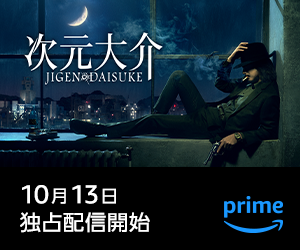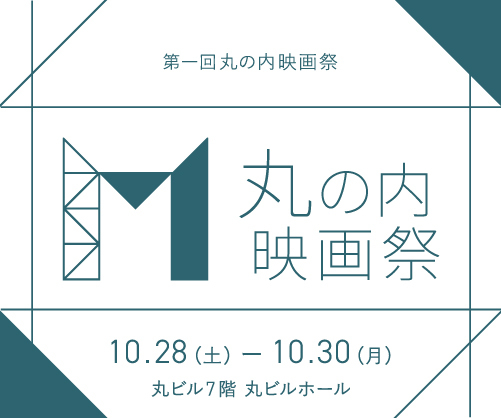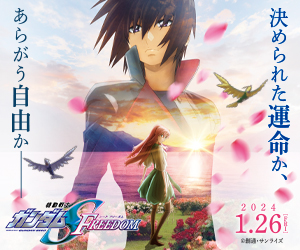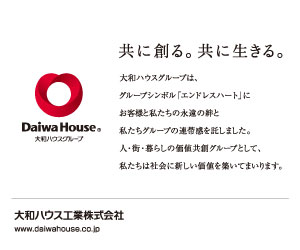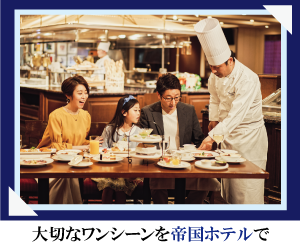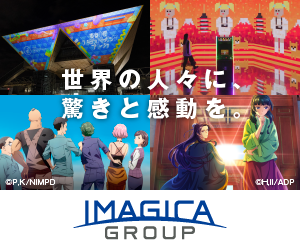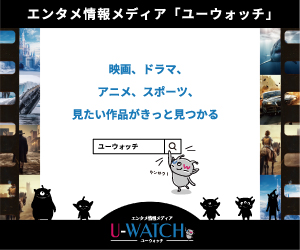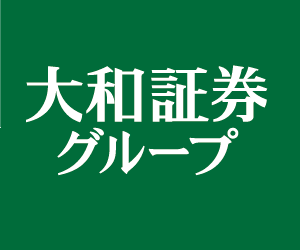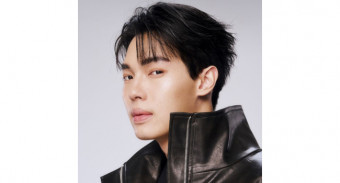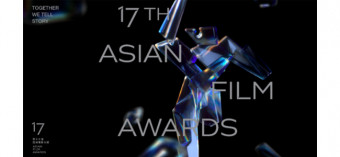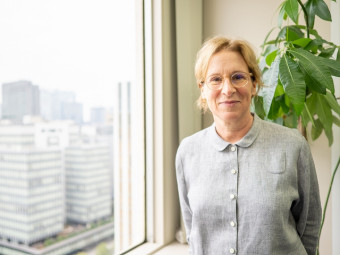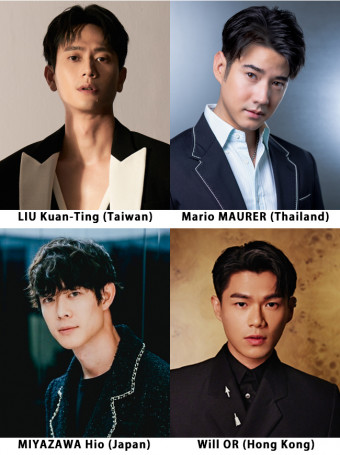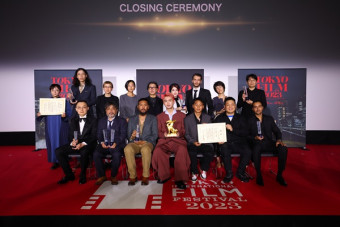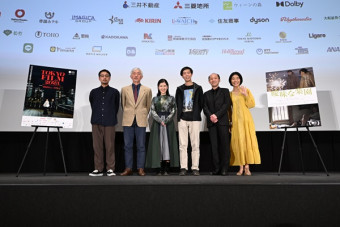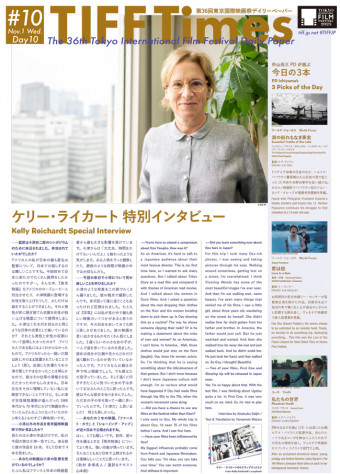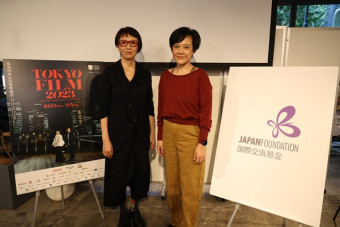The Tokyo International Film Festival (TIFF) today unveiled the full lineup and other highlights of its 36th edition in a press conference held at Tokyo Midtown Hibiya, one of the festival’s main venues.
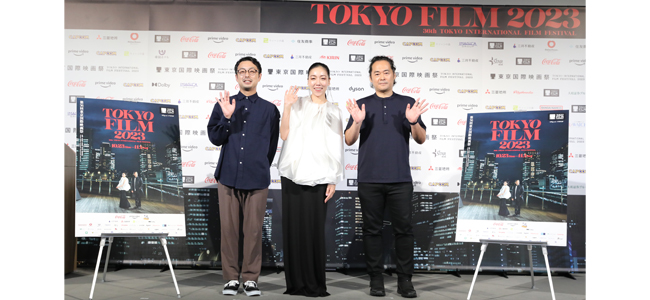
The 36th TIFF will feature screenings and a variety of related events in the Hibiya-Yurakucho-Marunouchi-Ginza area of Tokyo from October 23 to November 1, 2023. The 10-day festival will open with a full-scale Red Carpet event with Japanese and international filmmakers and guests.
As previously announced, TIFF will be celebrating the 120th anniversary of OZU Yasujiro’s birth with an extensive retrospective, as well as the 70th anniversary of Godzilla.
Festival Chairman ANDO Hiroyasu delivered opening remarks at the conference, outlining a range of enhancements that are being made to this year’s edition, including an expansion of the number of films in the lineup, a five-fold increase in international guests, special screenings and events dedicated to Ozu, strengthened collaboration with other countries/regions in Asia, and the launch of a program aimed at reaching both Japanese and foreign students studying film in Japan.
TIFFCOM Managing Director KURIHASHI Mikiya then discussed TIFFCOM 2023, the TIFF’s affiliated marketplace, which will be marking its 20th edition and the first to be held physically since 2019, due to Covid. Running from October 25 to 27 at the new Tokyo Metropolitan Industrial Trade Center Hamamatsucho Building, TIFFCOM will now be located closer to TIFF’s venues, and feature expanded space for overseas exhibitors, the new TOKYO Story Market, an expansive lineup of talks and events, and the 4th annual Tokyo Gap-Financing Market program.
Internationally acclaimed German filmmaker, writer and photographer Wim Wenders, who will serve as the President of the International Competition Jury at the 36th TIFF, sent a message that was shared with the audience (See below). His fellow jurors will be Spanish filmmaker Albert Serra, Chinese actress and producer Zhao Tao, Vietnamese producer Tran Thi Bich Ngoc, and Japanese producer KUNIZANE Mizue.
The 36th TIFF Festival Navigator ANDO Momoko then took to the stage, wearing the same outfit that she posed in (with her father, actor OKUDA Eiji) for the TIFF poster, and shared her thoughts on serving in the position, which was previously called the Festival Ambassador.
Following an introduction to TIFF Opening Film Perfect Days (by Wim Wenders) and Closing Film Godzilla Minus One (by YAMAZAKI Takashi), TIFF Programming Director ICHIYAMA Shozo greeted the audience and shared highlights of the festival’s nine sections, including the Competition, Gala Selection, Nippon Cinema Now and others. The Competition includes 15 films*, ten of them world premieres, selected from among 1,942 titles from 114 countries and regions.
*→ The full list of Competition titles.
Two Japanese directors whose work will be world premiered in the TIFF Competition section then joined Ichiyama on stage to make remarks about their selection: KOTSUJI Yohei (A Foggy Paradise) and TOMINA Tetsuya (Who Were We?). (See below for comments.)
Senior Programmer ISHIZAKA Kenji introduced the Asian Future section lineup and provided highlights of the 10 films from emerging filmmakers in Hong Kong, Singapore, Malaysia, Kazakhstan, Pakistan, India, Iran, Israel, Thailand, Turkey and Japan, all of whom are receiving their world premieres and will be eligible for awards. He noted that three of the films were directed by women, and nearly all the titles focus on families grappling with modern life, reflecting deep insights into the areas in which they live.
Animation Programming Advisor FUJITSU Ryota provided an overview of the revitalized Animation section, which will now include internationally acclaimed animated works as well as Japanese titles. It will feature seven recent Japanese masterworks, as well as five films from overseas, including two from China. There will also be seminars on the Portrayal of Youth and the Possibilities of Animated Expression.
→ The full lineup of the Animation section
For the fourth year, TIFF and The Japan Foundation will be co-presenting the popular TIFF Lounge talk sessions, featuring leading auteurs from Asia and beyond. This year’s participants include Zhang Yimou, Tran Anh Hung, Yamada Yoji, Yang Yonghi, and the two recipients of the Kurosawa Akira Award, Mouly Surya and Gu Xiaogang. Among the many other event highlights will be a masterclass with Hong Kong superstar Tony Leung; a Kering’s Women In Motion event; an Ozu Yasujiro “Shoulders of Giants” symposium with Jia Zhangke, KUROSAWA Kiyoshi and Kelly Reichardt; a discussion between TAKASAKI Takuma, the screenwriter of TIFF Opening Film Perfect Days and filmmaker Kawamura Genki, who produced Kore-eda’s latest film, Monster; and a TIFF Roundtable highlighting the Female Gaze on Film Journalism, with international practitioners.
Quotes from Press Conference Guests
–Message from Wim Wenders, President of the International Competition Jury, 36th TIFF
I’m excited to be back at the Tokyo International Film Festival. I only have the best memories of my first jury presence and the jury members from that time are still in touch, still calling each other “Claudie-san*” and “Paul-san*” and “Wim-san*.” For this festival happening 60 years after the death and therefore 120 years after Ozu’s birthday, my declared master, makes the occasion very special to me.
*Claudie Ossard (Producer) and Paul Auster (Writer). “-san” is a Japanese common honorific title.
-Ando Momoko, Festival Navigator, 36th TIFF
The position of TIFF “ambassador” has now changed to “navigator,” which I think reflects the festival’s navigation from the pre- to the post-Covid world. I’m really proud to be in this position. I have a long relationship with TIFF, and I love coming because it’s always such a great opportunity to meet filmmakers and film lovers from Japan and around the world. When you talk about film, you must talk about the emotions that they spark. Film is all about the future, and it can help us to navigate our own lives. I’m really looking forward to meeting everyone during this year’s festival!
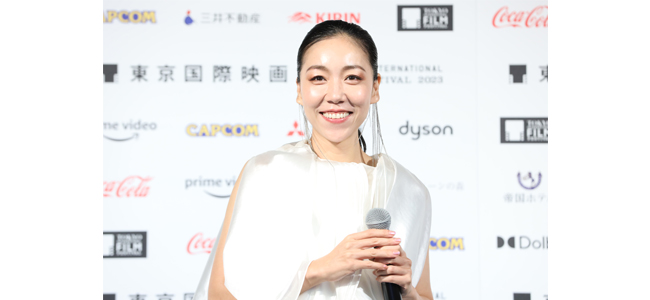
-Kotsuji Yohei, Director of Competition film A Foggy Paradise
This is the first time I’ll participate in TIFF, and I’m really honored to be here. I spent some time with my grandfather before he passed away, and based on that, I created this film. I wanted to capture the moments of fogginess, to create something more realistic and more aligned to our lives. I want to thank my cast and crew, who really gave me their all to help me create this film.
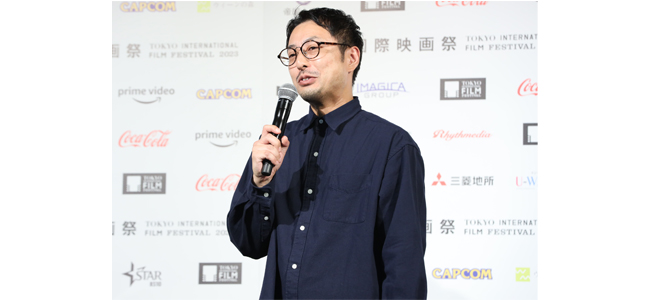
-Tomina Tetsuya Director of Competition film Who Were We?
It’s also my first time to participate. In the past, I came to watch my favorite directors’ films, so I’m looking forward to taking part as a director this year. I was in the Tokyo Gap-Financing Market at TIFFCOM last year, but it was all online. I shot the film on Sado Island and Niigata. The first time I visited Sado Island, I was really inspired by the goldmine. My producer is actually my wife, and we created this small film with wonderful actors and a small crew. We all put our passion into the work, and I’m so happy to be selected.
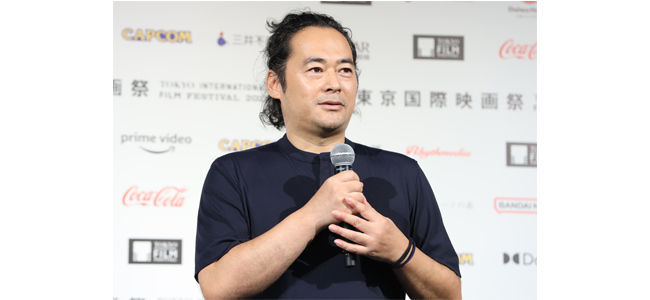
Quotes from the TIFF Chairman, Programming Director
-Ando Hiroyasu, Chairman, 36th TIFF
The most important aspect of a film festival is the films themselves. This year, we will have an increase of 25% in the number of films being shown, from 174 (in 2022) to 219.
We’ve been focusing on enhanced international interactions this year and expect to have more than 300 guests, from jury members to directors, actors and special guests. We also expect some 300 others from the film industry who will also be attending the TIFFCOM market. In total, the number of guests has increased from 104 (2022) to more than 600 (2023).
We’re also have the TIFF Lounge once again, featuring filmmakers from Japan and overseas, participating in talks in front of an audience. The opening will be at the Takarazuka theater once again, and because Covid has subsided substantially, we’re considering having an opening party.
As part of our Ozu Yasujiro-related events, we will be screening nearly all his films in collaboration with the National Film Archive of Japan, many of them in restored versions, as well as conducting discussions and a symposia.
TIFF is located in Asia and we would really like to deepen collaborations with other Asian countries and regions. More than 60% of the films will be from Asia, along with over 50% of guests. We’ll have events focusing on Shanghai, Taiwan, Korea and Hong Kong. We have two Asian filmmakers who will be receiving the Kurosawa Akira Award, and we’ve also launched a student program, inviting Japanese and Asian students from ASEAN and other countries.
-Ichiyama Shozo, Programming Director, 36th TIFF
The number of submissions for the Competition was higher this year, and the quality of the films was very high, so we had a lot of problems making our selection. We’re pleased that we have three Chinese films this year, whereas last year we had none. We have also selected films from Azerbaijan, Argentina, Chile, Georgia, Germany , Iran, Luxembourg, Netherlands, the Philippines, Russia, Switzerland and the US. The directors and actors will be coming to TIFF, so please look forward to the Competition section.
In the Nippon Cinema Now section, we have 10 titles, each of them unique in different ways. Our Director in Focus this year shines a spotlight on the works of director JOJO Hideo, and we will be showing four of his recent films. All of these are with English subtitles, so we hope that overseas audiences will also have an opportunity to see them.
Thirty years ago, I was an employee of Shochiku and I was in charge of the 90th anniversary tribute to Ozu Yasujiro, which was very popular with packed audiences. With Ozu, we always have new findings because there’s so much to explore. We’ll be presenting restored and digital versions of his work, as well as the world premiere of A Straightforward Boy, and I hope you’ll enjoy this special tribute. We also have great directors — Jia Zhangke, Kelly Reichardt and Kurosawa Kiyoshi — who will be discussing Ozu’s ongoing impact.
We also have special collaborations with various organizations and festivals to showcase titles from Latin America, a Taiwan Focus, a Hong Kong Focus, a spotlight on Basque cinema, a special program celebrating the 100th anniversary of Franco Zeffirelli, and a range of outdoor screenings.
During a Q&A session at the end of the press conference, the two Japanese directors in the Competition section, Kotsuji Yohei and Tomina Tetsuya, and TIFF Navigator Ando Momoko were asked how they think films can “navigate” toward the future in their own filmmaking.
Said Ando, “I think, going forward, there will be revolutions in cinematography as well as in the way we watch films. Technology develops so fast, but because of that, we’re going back to the origin of film. Through the language of films, the perspectives of the filmmakers, we’re still experiencing stories through our hearts and minds.”
Kotsuji said, “Filmmaking is like a personal project for me. I’ve only made a short film previously. Maybe in a few years’ time, I’ll be able to find my own style of film and filmmaking.”
Tomina admitted, “I also created my own style of film. It’s scary to shoot a film because there’s a history behind filmmaking, so you can’t just say ‘I made a film because I wanted to.’”
Ando was asked about the process of shooting the TIFF poster with her father, acclaimed actor-director Okuda Eiji, and the joint project they hinted at. She responded, “I had this perception that an invisible baton was being passed on to me, and I will be passing it on to the next generation. I can’t disclose anything about the project except to say that it’s already finished, and you should watch my Instagram.”
TIFF Chairman Ando Hiroyasu and Programming Director Ichiyama Shozo were asked about sexual harassment and abuse in the film industry, a topic that has been very much in the news in Japan. Ando responded, “We’re very sincere about working toward helping to eradicate abuse, to provide a workplace that’s safe for everyone. We are conducting comprehensive discussions about the best measures and take this very seriously.”
Queried about TIFF’s evident gender imbalance, represented by the predominance of men on stage during the press conference, Ando said, “We’ve been paying a lot of attention to achieving a balance between male and female directors in our lineup. We have 77% male and about 20% female this year. We pay attention to the imbalance, but our focus is on the works themselves. We continue to have a commitment to gender parity. We have an equal proportion of females and males on our juries, and our staff is well balanced, with 62% women. We were able to raise the percentage of female staff over the last year from 56.2% and will continue to monitor this.
Ichiyama added: “Those of us appearing here on the stage aren’t the only ones making the decisions. We have females on our selection committee and other committees, and they have a say in the decisions.”
Asked whether there is a reason for holding film festivals anymore, Ichiyama said, “I always loved going to movie theaters, since you can share your emotions with others in the audience and talk with your fellow viewers afterwards. You may feel that film festivals aren’t necessary since we can watch films on our phones. But we want to bring together everyone involved in making films, to give them a platform for communications. It’s not just about watching films. We want to offer something more.”
Queried about the selection of the two winners for this year’s Kurosawa Akira Award, since the filmmakers are quite young, Ichiyama responded, “There’s been a change in the selection process on this committee. We agreed that we wanted to select people who can lead the future of cinema. Our awardees this year are younger than last year, but we feel they represent the future of film.”
The Official Selection in Numbers
1,942 total submissions (last year: 1,695)
114 counties and regions of production (last year: 107)
219 screening films (last year: 174)
Approx. 20.6% by female directors, approx. 77.7% by male directors












